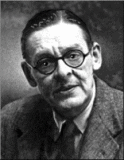Six years ago, as the hours of the old year ticked away, I rushed to finish writing about a significant literary milestone: the 500th anniversary of Thomas More’s Utopia. That book was so influential—such a revolution in the history of Western thought—that it would have been shameful nor for me to take note of it.
I feel the same way about The Waste Land. While More dared to imagine an ideal society of the future, T.S. Eliot anatomized his contemporary world—a post-WWI environment with its illusions of peace, safety, and even belief in a higher spiritual power rudely dashed.
In his 1919 essay “Tradition and the Individual Talent,” Eliot propounded his belief that poetry should be “impersonal”—i.e., for a separation of a poet as a man and a poet as an artist. But the personal drama in his own life inevitably colored the atmosphere of his most famous poem
At the time of the composition and publication of The Waste Land, Eliot was involved in a train wreck of a marriage to Vivienne Haigh-Wood. In 1921, following stress occasioned by tensions between his wife and his visiting mother, Eliot suffered a nervous breakdown.
It was during the period of recuperation under psychiatric care that Eliot was able to complete his poem. In the process, he grafted his own disgust, sense of sexual disruption, and emotional and spiritual depletion onto an entire culture.
Google “The Waste Land’ and “humor” and numerous hits will come up in the search. But whatever comedy exists in the poem is of a very black kind indeed.
That may mark its major difference with another modernist masterpiece published in 1922, James Joyce’s Ulysses, a novel that encompasses parodies, puns, and sometimes laugh-out-loud snatches of dialogue as Leopold Bloom and Stephen Dedalus trek in 24 hours across an all-too-earthy Dublin.
In contrast, “The Waste Land,” with its nightmarish evocation of the “Unreal City” of London, is about as funny as a heart attack.
The great turning point in Eliot’s occurred five years later, with his conversion to the Anglican Church. But he had to hit rock bottom before he could make this decision that, he felt, saved his life.
The Waste Land anticipated this turn through its cycle of life, death and rebirth, especially in repeated references to water. (In the section “A Game of Chess,” a husband believes that “The hot water at ten” is just the thing to calm down his wife.)
Writers as various as F. Scott Fitzgerald, Hart Crane, Seamus Heaney, Ted Hughes, Derek Walcott, and Bob Dylan have incorporated Eliot’s themes and concerns into their own work.
Not all this poem’s influence has been benign: Eliot’s textual pyrotechnics—literary allusions, symbolism, untranslated foreign phrases, fragmented conversational slang—have inspired countless dissertations. And Ezra Pound’s major surgery on the manuscript—half left by the wayside after his aggressive editing—probably only succeeded in making a demanding work even more opaque.
At the same time, writing-workshop imitators have seen some of its more arcane passages as a license to conflate obscurity and profundity. The accessibility that poets in the public eye once enjoyed has, not surprisingly, been significantly undermined as a result.
In the end, little
of this diminishes the achievement of this ambitious poem. In his 1948 Nobel Prize acceptance speech, Eliot said that “while language constitutes a
barrier, poetry itself gives us a reason for trying to overcome the barrier….
Partly
through his influence on other poets, partly through translation,…partly
through readers of his language who are not themselves poets, the poet can
contribute toward understanding between peoples.”

No comments:
Post a Comment